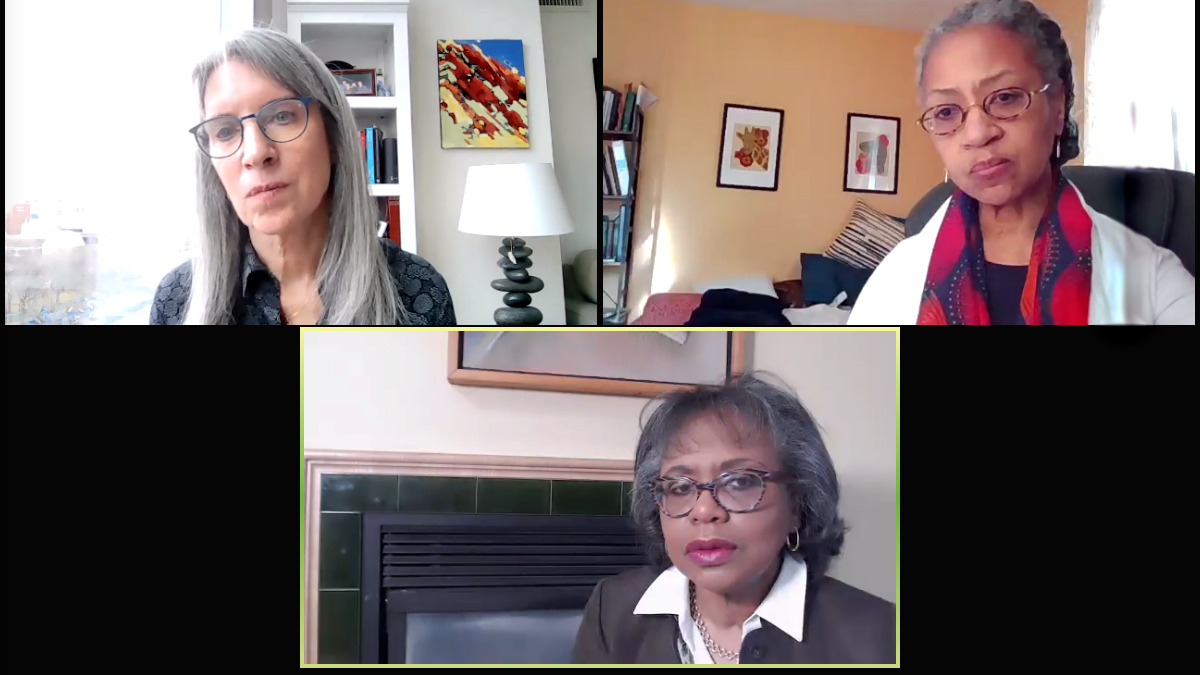
By Bethany Romano, MBA’17
In honor of Martin Luther King Day, the Heller School hosted a virtual event on Jan. 18 featuring Anita Hill, University Professor of Social Policy, Law, and Women's, Gender and Sexuality Studies. During the webinar, titled “The Future of Equality and the U.S. Supreme Court,” Hill provided insight into the court’s role in advancing equality on the eve of a new presidential administration.
The conversation was structured around questions submitted in advance from Heller students, and moderated by Cindy Parks Thomas, associate dean for research, and Maria Madison, associate dean for equity, inclusion and diversity as well as director of the Institute on Assets and Social Policy. Nearly 500 members of the Brandeis community were in attendance, and this event also served as a class session for Heller’s new winter break pro-seminar on racial equity.
“The topics we’re talking about today are, I believe, universal topics, but also very personal topics for most of us,” said Hill in her opening statement. She went on to contextualize the “Stop the Steal” campaign and ensuing mob attack on the U.S. Capitol in terms of heightened resistance to equality from the far right.
“High Black voter turnout resulted in the perception that the election was illegitimate…that people of color and even women have ‘taken over,’” said Hill. She encouraged Heller social policy scholars and researchers to prioritize equality in their work, and to think about an integrated concept of equality that includes “human rights, constitutional law, civil rights law, labor law, environmental law, as well as criminal law.”
Many of the student questions that Hill addressed focused on the unique circumstances of the present moment: efforts to expand (or “pack”) the Supreme Court; the potential impact of the three deeply conservative, Trump-appointed justices; and speculation on future court decisions related to immigrants’ rights, racist policing, and women’s health.
Hill expressed personal reservations about expanding the Supreme Court, citing the precedent that would set for future administrations to manipulate the court in their favor. A larger court would also make unanimous decisions – which are very meaningful – less common. A more attractive solution, she suggested, might come in the form of ethics bans that prevent judges from being active members of partisan groups, such as the Federalist Society.
When asked to speculate on upcoming cases and rulings, Professor Hill said, “We can expect a continued narrowing of protections for these communities; a narrowing of what the concept of ‘equality’ actually even means.” She predicts shrinking protections for workers, in particular, and also fewer class action cases. Class action lawsuits are important because they can allow more systemic change, particularly in workforces across industries.
Hill closed her remarks with a call to Heller students and alumni, in particular, to contribute to the issues that inspire them. “Courts are reactive. They react to what is brought to them. So we need to think about what we’re going to be bringing to them as advocates and lawyers.”
“We have a window of opportunity over the next two years to think creatively and expansively about what equality means…When we think about equality, I hope we think in a 21st century way. Using data, understanding the intersections of the different platforms for getting to equality, but also the different people who are beneficiaries of our efforts. I’m hoping this will start a nuanced conversation and give us all something to look forward to as we celebrate Martin Luther King, as well as this new administration.”
Full video of the event:
